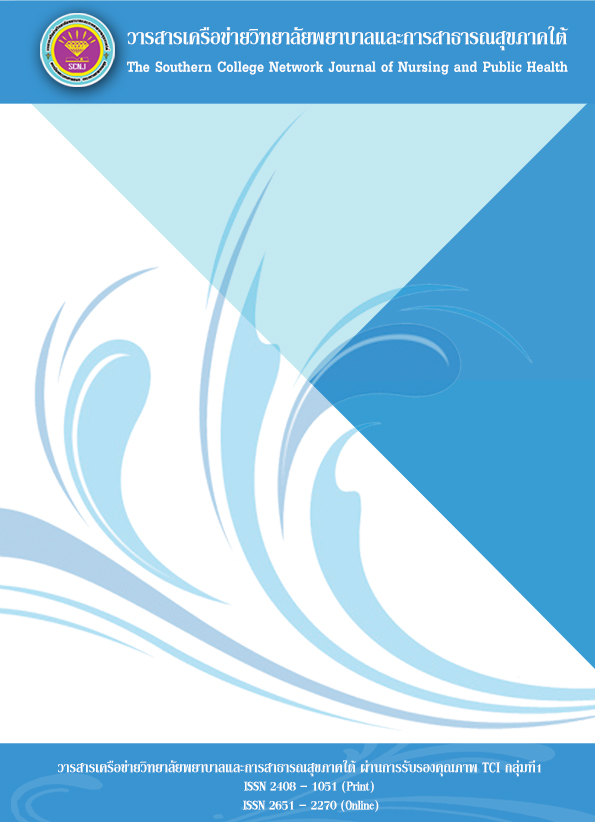ความเครียดในสตรีที่เป็นเบาหวานขณะตั้งครรภ์และบทบาทพยาบาลผดุงครรภ์
คำสำคัญ:
ความเครียด, สตรีที่เป็นเบาหวานขณะตั้งครรภ์, บทบาทพยาบาลผดุงครรภ์บทคัดย่อ
เบาหวานขณะตั้งครรภ์นับนับเป็นภาวะแทรกซ้อนที่เกิดขึ้นในสตรีตั้งครรภ์ทั่วโลกและมีแนวโน้มเพิ่มขึ้นอย่างต่อเนื่อง สตรีที่เป็นเบาหวานขณะตั้งครรภ์ต้องเผชิญกับความต้องการและแรงกดดันตั้งแต่ได้รับการวินิจฉัยจนถึงตลอดการตั้งครรภ์ ทั้งการรับรู้ถึงภาวะเสี่ยงของการตั้งครรภ์ มีการปรับเปลี่ยนพฤติกรรมในการรับประทานอาหาร รวมถึงการได้รับการดูแลรักษาที่มากกว่าสตรีตั้งครรภ์ปกติ จากความต้องการและแรงกดดันดังกล่าวส่งผลกระทบต่อสภาพจิตใจของสตรีที่เป็นเบาหวานขณะตั้งครรภ์ที่นำไปสู่การเกิดความเครียดได้ จะเห็นได้ว่าความเครียดจากการเป็นเบาหวานขณะตั้งครรภ์เป็นปัญหาสำคัญที่พยาบาลผดุงครรภ์ต้องให้การดูแลอย่างเหมาะสม เนื่องจากความเครียดที่เกิดขึ้นนั้นจะส่งผลกระทบที่รุนแรงต่อสตรีตั้งครรภ์และทารกในครรภ์ บทความวิชาการฉบับนี้มีวัตถุประสงค์เพื่อนำเสนอระดับความเครียดในสตรีที่เป็นเบาหวานขณะตั้งครรภ์และบทบาทพยาบาลผดุงครรภ์ในการจัดการความเครียดสำหรับสตรีที่เป็นเบาหวานขณะตั้งครรภ์ซึ่งพยาบาลผดุงครรภ์มีบทบาทสำคัญในการวางแผนให้การดูแลและป้องกันการเกิดความเครียดในสตรีที่เป็นเบาหวานขณะตั้งครรภ์ ไม่ว่าจะเป็นการประเมินระดับความรุนแรงและอาการของความเครียด รวมไปถึงการส่งเสริมความรู้สึกมีคุณค่าในตนเอง การให้ความรู้เกี่ยวกับภาวะเสี่ยงของการตั้งครรภ์ และการฝึกผ่อนคลาย เพื่อลดการเกิดความเครียดในสตรีที่เป็นเบาหวานขณะตั้งครรภ์
เอกสารอ้างอิง
American College of Obstetricians and Gynecologists. (2006). Exercise in pregnancy. Royal College of Obstetricians and Gynaecologists, 4, 1-7.
American Diabetes Association. (2014). Diagnosis and Classification of Diabetes Mellitus. Diabetes Care, 37(1), 81-90.
Boonyaporn, T., & Saetan, C. (2017). Nursing Role: Stress Management of Pregnant Teenage. The Southern College Network Journal of Nursing and Public Health, 4(3), 271-281. (in Thai)
Cashion, K. (2012). Endocrine and Metabolic Disoders in Pregnancy.In D. L. Lowdermilk, S. E. Perry, M. Cashion, & K. Alden (Eds.), Maternity and Women’s Health care (10th ed., pp.688-707). St. Louis: Elsevier Mosby.
Chunpradub, P. (1995). The Relationship Between Self-Esteem, Social Support and Coping Behavior in High-Risk Pregnant Women, (Master of Nursing Science Maternal and Child Nursing). Graduate School, Mahidol University. (in Thai)
Cunningham, F. G., Leveno, K. J., Bloom, S. L., Spong, C. Y., Dashe, J. S., Hoffman, et al. (2014). Williams Obstetric (24th ed.). New York: McGraw-Hill.
Diabetes Association of Thailand Under the Patronage of Her Highness Princess Maha Chakri Sirindhorn. (2014). Clinical Practice Guideline for Diabetes.Retrieved from http://203.157.39.7/imrta/images/cpg20141120.pdf
Heaman, M. I., & Gupton, A. L. (2009). Psychometric Testing of the Perception of Pregnancy Risk Questionnaire. Research in Nursing & Health, 32(5), 493-503.
Hjelm, K., Bard, K., Nyberg, P., & Apelqvist, J. (2007). Management of Gestational Diabetes from the Patient’s Perspective a Comparison of Swedish and Middle-Eastern born women. Journal of Clinical Nursing, 16(1), 168–178.
Hui, A. L., Sevenhuysen, G., Harvey, D., & Salamon, E. (2014). Stress and Anxiety in Women with Gestational Diabetes During Dietary Management. The Diabetes Educator, 40(5), 668-677. doi: 10.1177/0145721714535991
Jittrapirom, A., & Chareonsanti, J. (2015). Effectiveness of Education Provision and Relaxation Training Program on Self-Care Behaviors, Blood Sugar Levels, and Stress among Gestational Diabetic Women. Nursing Journal, 42(4), 133-145. (in Thai)
jittrapirom, A., Chareonsanti, J., & Sriraporn, P. (2014). Pregnancy Risk Perception, Uncertainty, and Stress Among Gestational Diabetic Women. Nursing Journal, 41(1), 50-61. (in Thai)
Kyrou, I., & Tsigos, C. (2009).Stress Hormones: Physiological Stress and Regulation of Metabolism. Current Opinion in Pharmacology, 9(6), 787-793.
Lawson, E. J., & Rajaram, S. (1994). A Transformed Pregnancy: The Psychosocial Consequences of Gestational Diabetes. Sociology of Health & Illness, 16(4), 536-562.
Lowdermilk, D. L., Perry, S. E & Cashion, M. C. (2014). Maternity Nursing (8th ed.). St. Louis: Mosby.
Mahatnirunkul, S., Pumpaisanchai, W., & Tapanya, P., (1997). Research Report Suanprung Stress. Test-60. Chiang Mai: Suanphung Hospital.
Mapakdee, P. (2008). Effects of Using the Participatory Learning Program and Telephone Visit on Knowledge, Self-care Behaviors, and Blood Sugar Level Among Gestational Diabetic Women, (Master of Nursing Science (Nursing Care of Women). Graduate school, Chiang Mai University. (in Thai)
Miller, L. H., Smith, A. D., & Rothstein, L. (1993).The Stress Solution: An Action Plan to Manage the Stress in Your Life. New York: Pocket Books.
Mitanchez, D. (2010). Foetal and Neonatal Complications in Gestational Diabetes: Perinatal Mortality, Congenital, Shoulder Dystocia, Birth Injuries, Neonatal Outcome. Diabetes & Metabolism, 36(6), 617-627.
Mulder, E. J. H., Robles, P. G., Huizink, A. C., Van den Bergh, B. R. H., Buitelaar, J. K., & Visser, G. H. A. (2002). Prenatal Maternal Stress: Effects on Pregnancy and the (Unborn) Child. Early Human Development, 70(1), 3-14.
Phongpate, K. (2016). Factors Predicting Stress Among Gestational Diabetic Women, (Master of Nursing Science Midwifery). Graduate school, Chiang Mai University. (in Thai)
Phrommasen, P. (2015). Hardiness, Social Support, and Stress Among Gestational Diabetic Women, (Master of Nursing Science Midwifery). Graduate school, Chiang Mai University. (in Thai)
Rojnawaseree, D. (2018). The Effect of Health Promotion and Spouse Support to the Blood Glucose Level and Health-Promoting Behaviors in Women at Risk of Gestational Diabetes Mellitus. Journal of Nursing, Public Health, and Education, 19(3). 47-58.
Rosenberg, M. (1965). Society and the adolescent self-image. Princeton, New Jersey: Princeton University Press.
Roy-Matton, N., Moutquin, J. M., Brown, C., Carrier, N., & Bell, L. (2011). The Impact of Perceived Maternal Stress and Other Psychosocial Risk Factors on Pregnancy Complications. Obstetrical & Gynecological Survey, 66(8), 475-476.
Singh, S. K., & Rastogi, A. (2008) Gestational Diabetic Mellitus. Diabetes & Metabolic Syndrome, 2(3), 227-234. doi: org/10.1016/j.dsx.2008.04.007
Soannoi, S. (2000). Effect of Supportive Nursing Care on Stress of Pregnant Women with Gestational Diabetes During Hospitalization, Graduate school, (Maternal and Child Nursing). Graduate school, Mahidol University. (in Thai)
Srisawad, K., & Panyapinijnugoon, C. (2016). Stress Among Pregnant Adolescents. Journal of The Royal Thai Army Nurses, 17(2), 7-11. (in Thai)
Stark, M. A., & Brinkley, R. L. (2007). The Relationship Between Perceived Stress and Health-Promoting Behaviors in High-Risk Pregnancy. Journal of Perinatal & Neonatal Nursing, 21(4), 307-314.
Suzie, D., Brin, F. S. G., Warren, S. D., Keith, J. C., Julie-Anne, P. B., & Robert, G. M. (2003). Gestational Diabetes Mellitus: Is a Diagnosis Associated with an Increase in Maternal Anxiety and Stress in the Short and Intermediate Term?. Diabetes Care, 26(2), 385-389.
Vargas, R., Repke, J. T., & Ural, S. H. (2010). Type 21 Diabetes Mellitus and Pregnancy. Reviews on Obstetrics and Gynecology, 3, 92-100.
Wongchantara, T., Uthaseri, S., Panncharoenworakul, K., & Serisathien, Y. (2001). Self-esteem Perceived Benefits and Health-promoting Behaviors in Diabetic Pregnant Women. Christian University of Thailand Journal, 7(1), 45-58.
ดาวน์โหลด
เผยแพร่แล้ว
ฉบับ
ประเภทบทความ
สัญญาอนุญาต
1. บทความหรือข้อคิดเห็นใด ๆ ที่ปรากฏในวารสารเครือข่าย วิทยาลัยพยาบาลและการสาธารณสุขภาคใต้ ที่เป็นวรรณกรรมของผู้เขียน บรรณาธิการหรือเครือข่ายวิทยาลัยพยาบาลและวิทยาลัยการสาธารณสุขภาคใต้ ไม่จำเป็นต้องเห็นด้วย
2. บทความที่ได้รับการตีพิมพ์ถือเป็นลิขสิทธิ์ของ วารสารเครือข่ายวิทยาลัยพยาบาลและการสาธารณสุขภาคใต้








